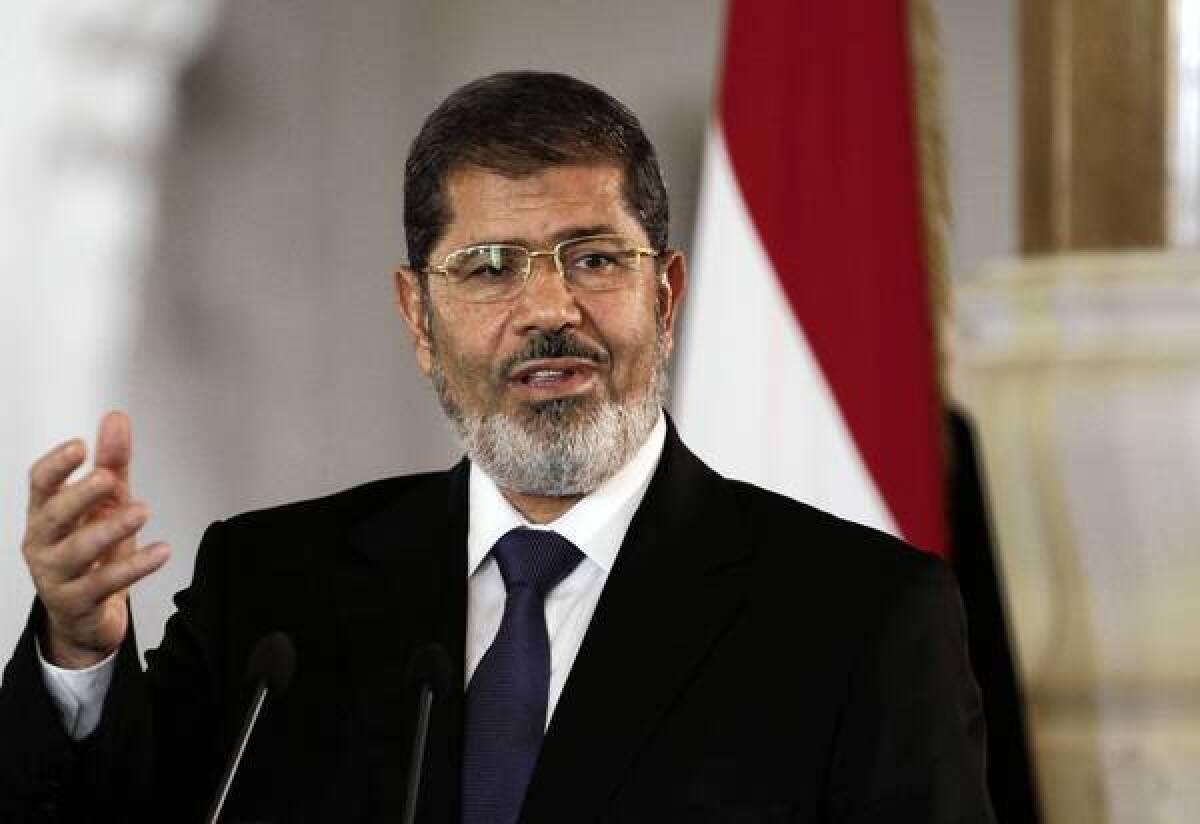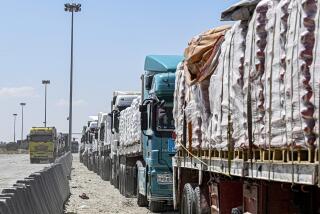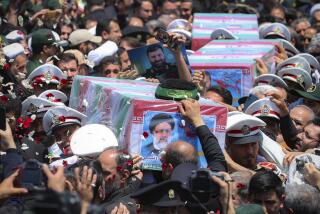Morsi may have misjudged Egypt’s tolerance of authoritarianism

CAIRO — Egyptian President Mohamed Morsi and the Muslim Brotherhood inherited a corrupt police state with failing institutions. Crime was rising, and the economy was in free fall immediately after longtime leader Hosni Mubarak was toppled last year.
But rather than reach out to secular and liberal voices, Morsi and the world’s most influential Islamist organization have often resorted to the rigid structure that helped the Brotherhood survive decades as a persecuted opposition movement. Though they have been overwhelmed by circumstances, their ability to lead the country has been further compromised by an authoritarian streak.
Angry protests that drew tens of thousands of people into Cairo’s Tahrir Square on Tuesday reveal that Egyptians no longer will accept an autocratic leader, whether an Islamist like Morsi or a secularist like Mubarak. A dispute with judges over separation of government powers has rallied liberals and non-Muslims who fear that Morsi aims to gradually expand Islamic law to alter the nation’s character and limit civil and religious freedom.
The restiveness in the streets could easily ignite widespread violence. Brotherhood offices in Alexandria and other cities were attacked Tuesday night. Fires raged and tear gas drifted across the skylines.
The resolute yet uncharismatic Morsi is both reviled and praised. Rival portraits of the peasant’s son who became an engineer and then president have emerged: a pragmatist seeking a constitutional democracy but willing to bend the rules to get there, or a political novice determined to stifle state institutions to further the Brotherhood’s dominance.
This split self is articulated in posters in Tahrir Square that depict the faces of Morsi and Mubarak as one and the same. It’s the caricature of a man who miscalculated, who perhaps did not fathom the limits of his popularity.
The president’s moves over the last week suggest that two Morsis are at work. A decree he issued placed his office beyond judicial oversight on matters dealing with state institutions, notably the Islamist-led assembly drafting a new constitution. Courts controlled by Mubarak-era judges had disbanded an earlier assembly and Morsi feared a similar fate awaited the current one.
Such a scenario would have further disrupted Egypt’s messy political transition and delayed new parliamentary elections. Morsi and the Brotherhood were stung in June when the nation’s highest court dissolved the Islamist-led parliament, sidetracking the Brotherhood’s Renaissance Project, an ill-defined economic and social plan to fix the country.
Morsi received another rejection from judges Tuesday when they reiterated their condemnation of his decree and urged a nationwide court strike. The actions followed a five-hour meeting between Morsi and the Supreme Judiciary Council on Monday that failed to produce a compromise.
The president’s battle with the judiciary epitomizes the Brotherhood’s wider struggle against entrenched remnants of the old regime maneuvering to upend Morsi through chaos and gridlock that jeopardizes foreign investment, security and Egyptians’ faith in the ideals of the 2011 revolution.
At key moments, however, the Brotherhood has relied on an authoritarian tendency in its erratic efforts to govern Egypt.
Morsi’s overall “aim is to establish a new undemocratic political system with the Brotherhood at the center of the state,” said Ashraf El Sherif, a political scientist at the American University in Cairo. “They are not interested at all in reforming the politics of the country.”
Many of those who took to the streets this week don’t trust the courts, either. However, they accuse Morsi of power grabs and have branded him a new pharaoh. The protesters don’t see a president’s pragmatism; they see Machiavellian ambitions by the Brotherhood to sideline the opposition, including leading figures such as Nobel laureate Mohamed ElBaradei.
“The people want to bring down the regime!” protesters shouted in the same chant used to unseat Mubarak.
Hundreds of young men and boys hurled rocks Tuesday at police around Tahrir Square. The Muslim Brotherhood canceled a large pro-Morsi rally planned in Cairo to avoid clashes with antigovernment protesters and soccer fans known as Ultras. But it joined ultraconservative Islamists in a march in Alexandria.
Throughout its 84-year history, the Brotherhood, founded by a schoolteacher, has been co-opted, marginalized and persecuted by Egypt’s leaders, who since 1952 had all been military men. Thousands of Brotherhood members were arrested and tortured during Mubarak’s 30-year rule. The Islamist organization survived, not by being democratic within its ranks, but by a rigid structural orthodoxy with a dedicated populist base.
The group’s authoritarian side has largely defined the Brotherhood’s problems in governing. Last year it expelled prominent young members who were seeking a more moderate political approach. Although Morsi was praised this month for his pivotal role in negotiating a cease-fire between Israel and Hamas in the Gaza Strip, he has been unable to convince opposition groups that he is a sincere democrat.
Morsi and the Brotherhood have often been overwhelmed, reacting — at times clumsily — to cascading crises. Political instability has caused the economy to plummet and threatens billions of dollars in desperately needed foreign investment. Crime is rising. Labor strikes multiply. And resurgent networks of Islamist militants have been killing Egyptian security forces in the Sinai Peninsula.
But, as he showed with his recent decree involving the courts, Morsi can be calculating. In August, he forced the resignations of the nation’s military commanders, including Field Marshal Mohamed Hussein Tantawi, who had controlled Egypt since Mubarak’s fall in February 2011 and despised the Brotherhood’s Islamist plans for the nation.
It was a bold move that showed Morsi was capable of eliminating the man who rivaled him for power, apparently backed by younger officers willing to strike a deal with the Brotherhood to replace their aging generals and advance their own careers. It also suggested that Morsi was open to reaching out to holdovers from Mubarak’s regime, including officials from police, intelligence and the courts, if they were willing to switch allegiances.
The pressing question is whether Morsi can outlast the protest movement. The long-divided opposition camp, famous for bickering and endless tweeting, has in recent days found cohesion and momentum. Four people, mostly boys and young men, have died in the violence and more than 500 have been injured. The nation’s suspicions over the Brotherhood are resonating, but so far the president is not blinking.
“Morsi is betting on the street’s fervor to die out. He will try to stretch this out to its limit,” said El Sherif. “It is not in his best interest to rescind this decree because it will be a blow to his popularity and the Brotherhood, but if this crisis continues, he will have to.”
Special correspondent Reem Abdellatif contributed to this report.
More to Read
Sign up for Essential California
The most important California stories and recommendations in your inbox every morning.
You may occasionally receive promotional content from the Los Angeles Times.











